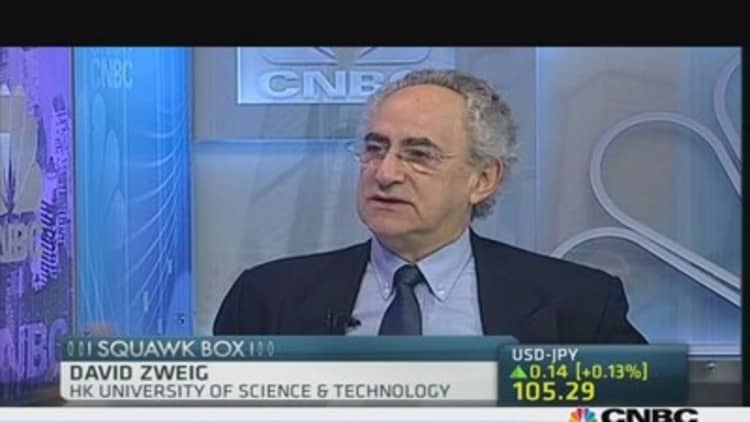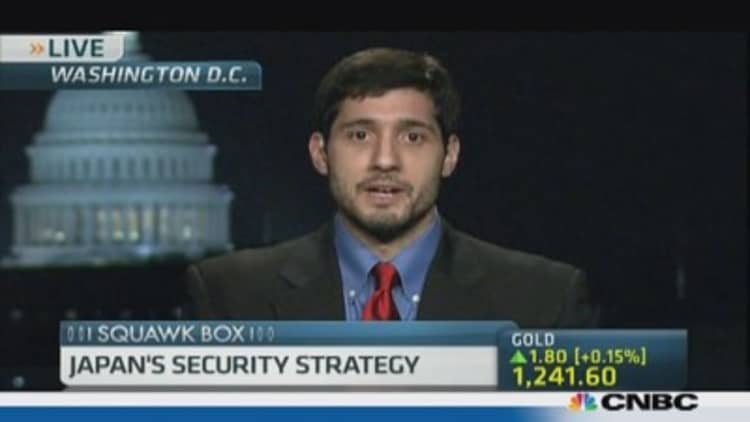Despite escalating military tensions over territorial claims in the South China Sea, China and Japan are witnessing booming bilateral trade, conducting negotiations of a free-trade agreement, maintaining an intense dialogue between their business communities and offering Japanese hospitality to a soaring number of Chinese visitors.
After a 10.8 percent decline last year, Japanese exports to China recovered briskly in the first half of this year, recording an annual decline of only 0.6 percent. In the following five months (i.e., between July and November), the growth of Japanese sales to their big neighbor accelerated to an average annual rate of 18 percent.
In the first eleven months of this year, Japanese exports to China – presumably Japan's dangerous rival – stood at the same level as those to the U.S. – Japan's key ally and protector in case of war. However, there was one big difference: Over that period, Japan ran a large trade deficit with China (accounting for half of Japan's total trade gap) and an even larger trade surplus with the U.S.
(Read more: Japan to bolster military, boost Asia ties to counter China)
A good deal for China, no doubt. But a U.S. trade deficit with Japan of nearly $62 billion (10 percent of America's total trade shortfall) is certainly no gift to the slowly recovering American economy.
Japan is also doing well on service trades with China. According to Japan's tourist authorities, only in September of this year the number of visitors from China exceeded 156,000, and a month later the Tokyo's Sunshine City Prince Hotel reported a sevenfold increase in Chinese guests.
And then – as if nothing untoward was happening in the South China Sea and in the Sea of Japan – negotiating teams from China, Japan and South Korea were meeting in Tokyo in late November to discuss a trilateral free-trade agreement covering a market of more than 1.5 billion people, with an estimated $690 billion in the annual trade volume.
(Read more: Asian nations weigh in after US, China ships almost collide)
At about the same time, a delegation of more than 170 Japanese businessmen went to China to improve the two countries' economic ties and to celebrate the resumption of strong trade relations. A similar Chinese delegation visited Japan in late September.
China's response to the shrine visit
It is against that background that the Japanese prime minister decided to pay respects to his country's war veterans at the Yasukuni shrine honoring 14 Class A WWII convicted war criminals – a gesture he knew would be very offensive to China, South Korea and other countries which suffered under the Japanese occupation.
While showing mixed feelings about the wisdom of upsetting China at a time of apparently heightened tensions over the territorial disputes, some Japanese political analysts don't see much that China can do about it. Some are even saying that China will not curtail trade ties with Japan.

I believe China will respond, but it will do so in its own time and in a way that will address Japan's broader political and security agenda.
And here is the agenda. Using an alleged threat of China's growing economic, political and military dominance, Japan has set out to (a) boost its economic growth by printing money, (b) step up its military buildup, (c) change its U.S.-imposed pacifist Constitution, (d) counter China's rising influence in East Asia and (e) become an aspiring regional security pillar.
A good bet is that Beijing is unimpressed by all that. China knows that its fast growing economy, its huge financial resources, incredibly rapid technological development and a steadfast alliance with Russia will make it an increasingly important player in shaping the changing world order.
(Read more: Place your bets: China or Japan?)
China also knows that Japan's political agenda may not sit well with Washington. First, because the U.S. does not seem eager for a military confrontation in the Pacific with a nuclear armed adversary -- which also owns nearly a quarter of America's debt held by foreigners -- in response to needlessly provocative actions of its friends and allies. Second, because Washington may see that Japan's offensive behavior toward South Korea is undermining its Asian strategy. Indeed, Japan and South Korea are supposed to work together to offset China's growing regional influence.
All that is certainly not lost on China. And some of the Japanese commentaries about Tokyo's motivation for its current and future plans may be music to China's ears.
Here is a sample.
A number of Japanese political analysts write that the country's present political class insists on visiting the Yasukuni shrine because they believe that Japan's war time leaders classified as criminals were victims of "victor's justice." According to these analysts, Japan's government also regards the country's present Constitution as a humiliation by an erstwhile occupying power.
All that has to change, they say. Japan should be free to worship its war veterans, and it should have its own Constitution. They, therefore, conclude that Japan has decided to take matters in its own hands because America's weak economy, and its fixation with intractable Middle East problems, make its commitment to Asia's security increasingly doubtful.

Reading that analysis, one has the impression that an unusual joint visit to Tokyo last October by U.S. secretaries of state and defense did not do much to convince Japan that America has the will and the means to remain the key Asia-Pacific military power.
Some investment strategy thoughts
I believe that investors should take this latest Japanese bravado with a handful of salt.
China – destination for about one-fifth of Japanese exports – could do a great damage to Japan's economy if it decided to use trade as a political weapon.
Exports play a key role in driving Japanese investments because the domestic market is too small and too weak to warrant strong and sustained expansions of production capacities. Despite soaring profits, a record-low cost of capital and cheap equity finance, Japanese business investments (13 percent of GDP) were falling at an annual rate of 2.3 percent in the first nine months of this year. It is easy to imagine what would happen to investments if exports to China were to go into a free fall as they did last year.
Clearly, the support of external demand will remain crucially important to Japanese economy and equity markets. Japan's falling wages and rising inflation are seriously eroding real disposable household incomes. With a puny savings rate of less than 1 percent, that does not bode well for domestic demand most people mistakenly see as the main driver of future economic growth.
Investors should look for a Japan striving to live in peace and harmony with its neighbors. I personally don't yen for a Japan currently rewriting its history books in a way that will offend its neighbors. And neither do I think that it is a good idea for Japan to pick a fight it can't win with the Celestial.
Michael Ivanovitch is president of MSI Global, a New York-based economic research company. He also served as a senior economist at the OECD in Paris, international economist at the Federal Reserve Bank of New York and taught economics at Columbia.
Follow the author on Twitter @msiglobal9


